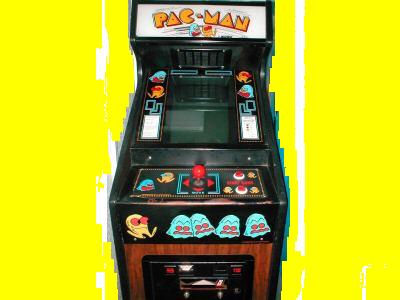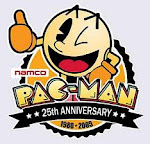 The Rubik's Cube dominated 1981.Christine has written to ask me about the early 1980s:You seem to have a great deal of knowledge, and I enjoy this blog, although I didn't experience the 1980's decade, in fact I was born in 1990! I'm currently studying early 1980s pop culture and fads and I wonder if you would list the toys and fads of that time - 1980 to 1983 - in chronological order. It was a fast-moving time, and I'd be grateful if you could give me a "feel" of how it all began?I'll do my best, Christine!
The Rubik's Cube dominated 1981.Christine has written to ask me about the early 1980s:You seem to have a great deal of knowledge, and I enjoy this blog, although I didn't experience the 1980's decade, in fact I was born in 1990! I'm currently studying early 1980s pop culture and fads and I wonder if you would list the toys and fads of that time - 1980 to 1983 - in chronological order. It was a fast-moving time, and I'd be grateful if you could give me a "feel" of how it all began?I'll do my best, Christine! BBC Radio 1 magazine, summer, 1980.
BBC Radio 1 magazine, summer, 1980.
The first major craze I recollect from the 1980s in the UK was Space Invaders. Invented in Japan in 1978, the first arcade machines were exhibited at UK trade shows in 1979 and the little beasties were attracting attention before the end of that year. In the early 1980s, the craze took off and 1980 and 1981 and 1982 - and beyond - rang to the sound of the machines . In 1981, handheld versions of the game were arriving in the UK.
We have a Space Invaders feature here.
 Chronologically speaking, the second major 1980s craze was the Rubik's Cube. Exhibited as the "Magic Cube" at the toy fairs of London, Paris, Nuremberg and New York in January/February 1980, this Hungarian creation, the gift to the world of Erno Rubik, was then re-manufactured (made lighter and easier to manipulate) and re-named. The remanufacturing and ease of manipulation would play a major role in the new Cube's fortunes - paving the way for speed-cubing.
Chronologically speaking, the second major 1980s craze was the Rubik's Cube. Exhibited as the "Magic Cube" at the toy fairs of London, Paris, Nuremberg and New York in January/February 1980, this Hungarian creation, the gift to the world of Erno Rubik, was then re-manufactured (made lighter and easier to manipulate) and re-named. The remanufacturing and ease of manipulation would play a major role in the new Cube's fortunes - paving the way for speed-cubing.
Ideal Toys, trusted purveyors of family favourite games for years, toyed with new names like 'The Gordian Knot' and 'Inca Gold' but finally settled on 'Rubik's Cube'.
There had been a small seepage of Magic Cubes beyond its native Hungarian borders since the first test batches had been released there just before Christmas 1977, via academics and small niche puzzle companies, but most people in the UK and elsewhere were unaware of its existence.
The Rubik's Cube trademark was registered in the UK in May 1980, but due to a tremendous shortage, the first Cubes did not begin arriving until the autumn.
The shortage stretched on into the spring of 1981, but from then on it was Cube mania! Noting interest in the puzzle, the British Association of Toy Retailers named it Toy of the Year in 1980, when the Cubes were in very short supply, and it won the title again in 1981 as the craze raged. The reason why the Cube is such an icon of the decade's popular culture is because the craze was so intense.Our Rubik's Cube material is here.
In 1980, the Sony Stowaway, the UK's first personal stereo, arrived. In 1981, it was patented under its original name - Sony Walkman - and as prices fell, these became must-haves. By about 1983, they were everywhere.
 Daily Mirror, July, 1981.
Daily Mirror, July, 1981.
'80s Actual Walkman mania here.
 Daily Mirror, December, 1981.
Daily Mirror, December, 1981.
Next on our list is CB radio. CB radio had first been used (illegally) in the UK in the 1960s, but successive governments seemed loath to legalise. In 1980, a huge illegal craze sprouted. There were news stories about CB radios intefering with other equipment - including fire and police communications and hospital equipment. CB was finally legalised in November 1981, and became wildly popular - even featuring in story-lines in Coronation Street and Terry And June in 1982.
Read our CB radio post here.
 Sunday People, November 1981.
Sunday People, November 1981.
The next biggie was Frogger - appearing on arcade machines in late 1981, and touted as a peaceful alternative to the warring Space Invaders and the like. From a spring/summer 1983 mail order catalogue. "Everyone's gone Atari..." Not in my district, they hadn't!
From a spring/summer 1983 mail order catalogue. "Everyone's gone Atari..." Not in my district, they hadn't!
The Atari games system was also climbing into the ascendancy in the early 1980s, but I can state, with all honesty, that being bog standard working class and poor, I never saw one at that time. A magazine advertisement from December 1982. Mr and Mrs Middle-Class and their kids experience the joys of modern technology.
A magazine advertisement from December 1982. Mr and Mrs Middle-Class and their kids experience the joys of modern technology.
 1982 saw the arrival of deely-bobbers or deelyboppers (the deely-bobbers name was patented in 1982 - with claim of usage since 1981, and had previously been applied to a children's toy - interconnecting building blocks - bearing no relation). The boppers were originally an American craze, but came over here very quickly, arriving in the summer of 1982. Boing! Boing!
1982 saw the arrival of deely-bobbers or deelyboppers (the deely-bobbers name was patented in 1982 - with claim of usage since 1981, and had previously been applied to a children's toy - interconnecting building blocks - bearing no relation). The boppers were originally an American craze, but came over here very quickly, arriving in the summer of 1982. Boing! Boing!
See how it all began here.
 I'm not sure when Pac-Man first made his UK debut. The first arcade games (then called Puck Man) were released in Japan in May 1980, but it took a year or two for him to appear here. Once again, an absolutely mega craze! WACCA - WACCA - WACCA!
I'm not sure when Pac-Man first made his UK debut. The first arcade games (then called Puck Man) were released in Japan in May 1980, but it took a year or two for him to appear here. Once again, an absolutely mega craze! WACCA - WACCA - WACCA!
Shake hands with the little fella here.
 From the complete non-sophistication of deelyboppers to something quite different - the ZX Spectrum was released in 1982. The computers were coming!
From the complete non-sophistication of deelyboppers to something quite different - the ZX Spectrum was released in 1982. The computers were coming!
1983 saw the Hip Hop era beginning and boomboxes or ghetto blasters swept in. For many, they soon became a must-have.
 As did Cabbage Dolls late in the year.
As did Cabbage Dolls late in the year.
Take a stroll through the Cabbage Patch here.
What wasn't in...
VCRs: only 5% of UK households had them in 1980, around 25% in 1985.
Microwave ovens - released in the 1960s, became prevalent in the mid-to-late 1980s.
Compact discs: in the shops from 1982/83, the price of a player was prohibitive.
Cell-phones: the first was unveiled in America in 1983. The first UK mobile phone call was on 1 January, 1985, with comedian Ernie Wise doing the honours.
My young nephew read this post through yesterday, and said:
"Uncle Andy, the early '80s were medieval!"
Though they weren't quite that, it's true that many youngsters sent back there would experience a severe shock!
"Where's my mobile?" "Where's my ipod?" "Where's my DVD?" "Where's my PC?"
"Wot you on about?" would be the reply...
 Star Wars toys really rose into the stratosphere in 1980, with the release of the second film, The Empire Strikes Back. Kids were by then aware that the saga was no one-off flash-in-the-pan, and with news of a third film in the offing, everybody wanted to get their hands on a Luke Skywalker or Darth Vader - or even an R2 D2 or C3PO.
Star Wars toys really rose into the stratosphere in 1980, with the release of the second film, The Empire Strikes Back. Kids were by then aware that the saga was no one-off flash-in-the-pan, and with news of a third film in the offing, everybody wanted to get their hands on a Luke Skywalker or Darth Vader - or even an R2 D2 or C3PO.




























































